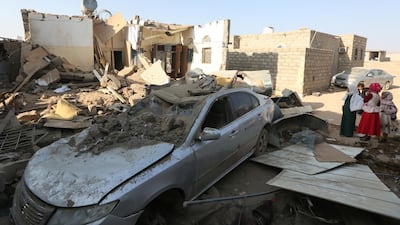Yemen’s military commanders battling the Iran-backed Houthis said their enemies' firepower had improved significantly in range and precision over the past couple of months, confirming reports that the rebels had obtained new weapons.
Col Abdul Basit Al Baher, a Yemeni army spokesman in the southern city of Taez, told The National on Saturday that the Houthis had used more destructive weapons since October last year.
The new arsenal caused a large number of military and civilian casualties in the densely populated city.
“They are using more destructive bombs than we have never seen before,” Col Al Baher said.
He said that during recent battles on the outskirts of Taez, the Houthis fired dozens of shells at government forces in a short period.
Military commanders said the intensity reminded them of the Houthis’ military expansion in the first months of 2015, when they used weapons seized from military bases across Yemen.
“Over the past four years their firepower weakened,” Col Al Baher said.
Yemeni army officers say the Houthis are now using machineguns with four pipes and more destructive 160 millimetre shells.
Houthi snipers have recently gunned down government forces at night and at a longer range.
“Their snipers shoot at night and within 2,000 to 2,500 metres," Col Al Baher said. "They are also using a developed kind of Grad rockets."
Yemen’s army has applied military tactics to confront Houthi weapons in Taez and other battlefields.
The effect of the Houthis’ firepower can be seen in the recent number of deaths among civilians and military troops over the past couple of months.
Houthi missile and drone attacks have killed hundreds of soldiers and civilians in Taez, Jawf, Marib and Hodeidah.
Last week, a report prepared by a panel of UN experts monitoring the arms embargo in Yemen said that the Houthis' new weapons were similar to those made in Iran.
The internationally recognised government and the Arab Coalition have long accused Iran of arming Houthis with ballistic missiles, drones and ammunition, and sending military experts to train and advise the rebels.
Analysts in Yemen believe the Houthis, with the help of international smuggling networks, have exploited security loopholes and corrupt military officers inside government-controlled territory to smuggle in weapons.
"The Houthis are paying some officers to allow them to smuggle weapons through entry posts controlled by the legitimate government," said Fatehi Ben Lazraq, editor of Aden Al Ghad newspaper in Aden. "Some army officers even sell weapons to Houthis."
Military and government officials suspect that Houthis are bringing in the Iranian weapons through ports under their control on the Red Sea.
"We in the government think that the arms come through Saleef port in Hodeidah," a government official told The National.
Hodeidah city, which hosts the biggest port in Yemen, has been the focus of a major military offensive since 2017.
Backed by the Arab Coalition, Yemeni government forces have managed to recapture major coastal areas on the Red Sea, including the Bab Al Mandeb waterway.
When government forces reached the outskirts of Hodeidah, Houthis bowed to the military pressure and agreed to hand over ports in Hodeidah under the UN-brokered Stockholm agreement.

